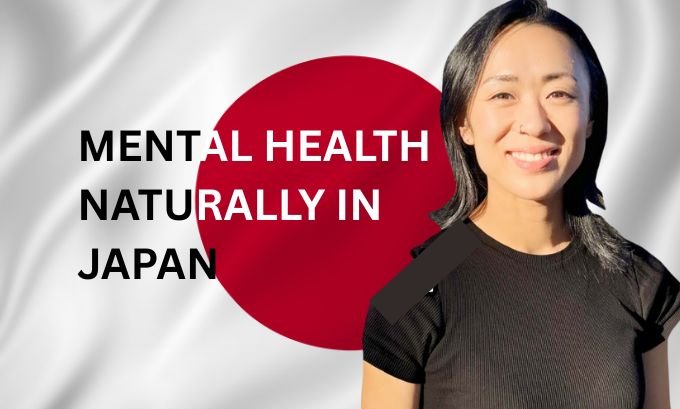For those living in Japan, learning how to improve mental health naturally involves blending modern wellness principles with timeless Japanese cultural practices. The most effective approach combines a nutrient-rich diet, restorative sleep, mindful movement, and strong community ties. By integrating these elements into your daily life in Japan, you can build a strong foundation for lasting mental and emotional resilience.
This guide offers a culturally-aware perspective on natural mental wellness in Japan. We will explore how traditional Japanese foods, unique environmental opportunities, and cultural concepts like ikigai can work in harmony with science-backed strategies to support your brain health and overall happiness.
Table of Contents
A Japanese Approach to Natural Mental Wellness
Navigating life in Japan presents its own unique set of pressures, from demanding work schedules to the complexities of social etiquette. Knowing how to improve mental health naturally here means tapping into the wisdom embedded within the culture while applying universal wellness principles. It’s about finding balance—or chōwa (調和)—in your daily routine.
Your path to better mental wellbeing begins with four key pillars, adapted for life in Japan: the traditional diet (washoku), restorative rest, mindful physical activity, and deep community connection.
Pillar 1: The Brain-Nourishing Power of the Japanese Diet
The traditional Japanese diet is globally recognized for its health benefits, and it is exceptionally well-suited for supporting brain health. It’s naturally rich in compounds that protect your brain’s neurons, enhance cognitive function, and stabilize your mood.
The Central Role of Omega-3 Fatty Acids in Japanese Cuisine
The Japanese diet is one of the richest in Omega-3 Fatty Acids in the world, thanks to its high consumption of fish. These fats, particularly EPA and DHA, are fundamental building blocks for your brain cells. DHA helps maintain the flexibility of neuron membranes for fast communication, while EPA is a powerful anti-inflammatory agent.

In Japan, accessing these nutrients is simple:
- Fatty Fish: Incorporate fish like mackerel (saba), sardines (iwashi), and salmon (sake) into your meals. A simple grilled saba for breakfast or lunch is a traditional and potent brain booster.
- Seaweed: Nori, wakame, and kombu are staples that contain modest amounts of EPA.
- Plant-Based Options: For those who don’t eat fish, edamame and natto (fermented soybeans) offer plant-based omega-3s, though an algae-based supplement is recommended to ensure sufficient DHA.
Personal Experience: An Expat’s Struggle with Energy Levels
I once consulted with a young American expat, “Michael,” working as an English teacher in Osaka. He felt constantly drained and mentally foggy, subsisting on convenience store (konbini) pasta and bread. He was missing out on the incredible nutritional resources around him.
What I Liked / Strengths of Our New Plan:
- Leveraging Convenience: We didn’t eliminate the konbini. Instead, we made smarter choices. He switched to onigiri (rice balls) with salmon, pre-packaged grilled fish, and hijiki seaweed salads.
- Simple Meal Swaps: We replaced his morning toast with a traditional Japanese breakfast set (teishoku) from a nearby cafeteria, featuring rice, miso soup, grilled fish, and pickles.
- Tangible Results: Within weeks, Michael reported a significant lift in his afternoon energy and mental clarity. He felt more connected to the culture and less reliant on sugary energy drinks.
Areas for Improvement:
- Navigating Sodium: Traditional Japanese food can be high in sodium (from soy sauce and miso). We had to be mindful of this, balancing salty items with fresh vegetables and lean proteins.
- Overcoming Food Hesitancy: For some, foods like natto or pickled vegetables (tsukemono) can be an acquired taste. The key was to start with familiar items like grilled fish and gradually introduce new flavors.
Steady Energy from Japanese Complex Carbohydrates
The foundation of most Japanese meals is rice. Complex carbohydrates like Japanese short-grain rice (uruchimai) and soba (buckwheat) noodles provide a slow, steady release of glucose. This keeps your brain energized without the sharp peaks and crashes caused by refined sugars, helping you maintain focus whether you’re in a long meeting or studying Japanese.
Antioxidant Power in Everyday Japanese Foods
Antioxidants protect the brain from oxidative stress. The Japanese diet is naturally packed with them.
- Green Tea: Matcha and sencha are loaded with catechins, powerful antioxidants known to improve cognitive function and reduce anxiety.
- Seaweed: Rich in fucoxanthin, an antioxidant that has shown neuroprotective properties in studies.
- Colorful Vegetables: Think of the pickled vegetables (tsukemono) served with meals—daikon radish, cucumber, and ginger are all rich in antioxidants.
Pillar 2: The Art of Restful Sleep in a 24/7 Culture
Japan’s work culture can be demanding, often at the expense of sleep. Yet, sleep is non-negotiable for brain health. During sleep, your brain consolidates memories and clears out metabolic debris. In a country that values hard work, intentionally prioritizing rest is a radical act of self-care.
Tips for Better Sleep in Japan:
- Embrace the Bathing Culture: The Japanese tradition of taking a hot bath (ofuro) before bed is not just for hygiene. Raising your body temperature and then allowing it to cool signals to your brain that it’s time for sleep.
- Create a Restful Environment: Invest in high-quality light-blocking curtains (shakō kāten) to deal with urban light pollution.
- Mindful Wind-Down: Instead of scrolling on your phone, try listening to calming music or practicing a few minutes of zazen (seated meditation).

| Common Sleep Disruptor in Japan | Impact on Mental Health | A Practical Japanese Solution |
|---|---|---|
| Long Commutes & Late Nights | Reduces total sleep time, increases stress. | Use commute time on the train for a brief “mindful disconnect”—close your eyes and focus on your breath instead of your phone. |
| Urban Noise Pollution | Prevents deep, restorative sleep. | Use earplugs or a white noise machine. Many Japanese apartments have excellent sound insulation; check for this feature. |
| Pressure to Socialize (Nomikai) | Alcohol disrupts REM sleep, leading to poor sleep quality. | It’s culturally acceptable to stick to oolong tea or non-alcoholic beer after the first drink. |
Pillar 3: Mindful Movement, from Forest Bathing to City Walking
In Japan, exercise is often integrated into daily life. It’s less about intense gym sessions and more about consistent, mindful movement.
Shinrin-Yoku (Forest Bathing)
Shinrin-yoku (森林浴) is the practice of immersing yourself in a forest environment. It is a scientifically validated practice for reducing stress and improving mental wellbeing. Research from Chiba University has shown that spending time in a forest can lower cortisol levels, reduce blood pressure, and decrease anxiety.
Japan’s extensive network of parks and accessible mountains makes this practice easy to adopt. Even a weekend trip to a place like Mount Takao near Tokyo or the Arashiyama Bamboo Grove in Kyoto can have profound mental health benefits.
Integrating Movement into Your Daily Routine
- Walking and Cycling: Most Japanese cities are incredibly walkable. Opt to walk or cycle for short trips instead of taking the train.
- Radio Taiso: Join the millions who start their day with Rajio Taisō (ラジオ体操), a gentle, broadcasted calisthenics routine. It’s a great way to wake up your body and mind.
- Stair Climbing: With train stations and multi-level department stores everywhere, you have endless opportunities to choose stairs over escalators, boosting your heart rate and blood flow to the brain.
Pillar 4: The Importance of Connection and Purpose (Ikigai)
Strong social ties and a sense of purpose are critical for mental health.
- Community Connection: While Japanese society can feel reserved, finding a group based on a shared hobby—be it a hiking club, a language exchange, or a pottery class—can help build deep, meaningful connections.
- Finding Your Ikigai: Ikigai (生き甲斐) is a concept that roughly translates to “a reason for being.” It’s the intersection of what you love, what you are good at, what the world needs, and what you can be paid for. Even reflecting on your personal ikigai outside of work can provide a powerful sense of direction and purpose, which is a cornerstone of mental wellbeing.
Frequently Asked Questions (FAQ)
1. How can I manage work-related stress in Japan?
Aside from the tips above, setting clear boundaries is key. It’s becoming more acceptable to leave work on time (teiji). Use your paid leave (yūkyū). Also, find a “third place”—a location that isn’t home or work, like a favorite café or park—where you can decompress.
2. Are mental health services accessible in Japan?
Yes, though navigating them can be a challenge. Major cities have clinics with English-speaking therapists and psychiatrists. The International Mental Health Professionals Japan (IMHPJ) is an excellent resource for finding qualified providers.
3. I find the Japanese diet expensive. How can I eat for brain health on a budget?
Focus on seasonal produce, which is always cheaper. Tofu and eggs are inexpensive, high-quality protein sources. Learn to love natto—it’s incredibly cheap and a nutritional powerhouse. Shopping at local supermarkets in the evening often means finding high-quality fish and bento boxes at a steep discount.
4. How can I practice mindfulness if I don’t have time for forest bathing?
You can practice mindfulness anywhere. Try “urban shinrin-yoku” by paying close attention to the small pockets of nature in your city—a tree on your street, the sky from your window, or a small shrine garden. Even the act of preparing and drinking a cup of green tea can be a meditative ritual.
5. How important is hydration?
Extremely. Japan’s humid summers make hydration critical. Dehydration impairs cognitive function and can worsen feelings of anxiety. Vending machines are everywhere, offering water and unsweetened teas like mugicha (barley tea), which is caffeine-free and very hydrating.
Conclusion
Learning how to improve mental health naturally in Japan is a journey of integration. It involves combining universal health principles with the unique cultural and environmental resources Japan has to offer. By nourishing your body with a traditional diet, honoring your need for sleep, moving mindfully through its beautiful landscapes, and connecting with a sense of purpose, you can build a resilient and thriving mind.
Start with one small change. This week, try swapping your morning coffee for green tea, or take a 20-minute walk through a local park on your lunch break. Each step is an investment in your long-term health and happiness in your life in Japan.
If you’re looking to stay updated with the latest Indian news, make sure to check out ponta.in, ibommanews.in and mumbaitimes.net for reliable coverage. For tech enthusiasts, techbullion.in and penzi.in offer fresh insights into gadgets, innovation, and digital trends. Want to dive into modern wellness and personal growth? Explore thoughtful content on mindjournal.co. For shopping authentic Japanese products, tokyomart.store is your go-to online store. And if you’re interested in the latest lottery results and tips, don’t miss out on jackpotresult.net. For love, lifestyle, and relationship reads, visit liteblogs.co—your companion for heart-centered content.
Author Bio
Dr. Kaito Tanaka, PhD, MPH
Dr. Kaito Tanaka is a clinical psychologist and public health researcher based in Tokyo. He holds a PhD in Psychology from Kyoto University and a Master of Public Health from the University of Tokyo. Dr. Tanaka specializes in cross-cultural mental health, focusing on the unique stressors and wellness opportunities within Japanese society. He has published extensive research on the benefits of traditional Japanese lifestyle habits, such as shinrin-yoku (forest bathing) and diet, on modern mental wellbeing.

